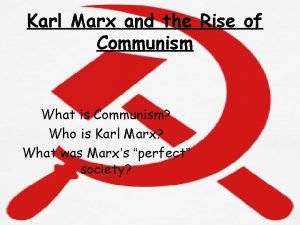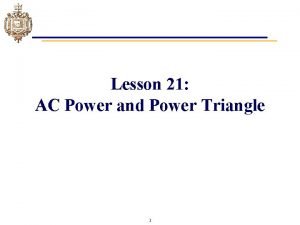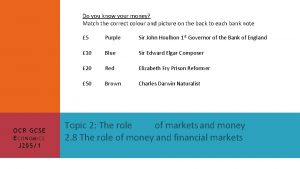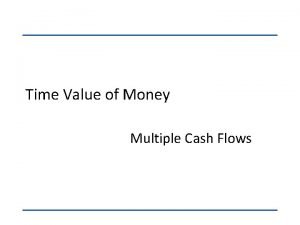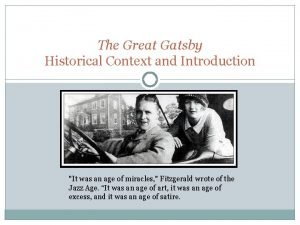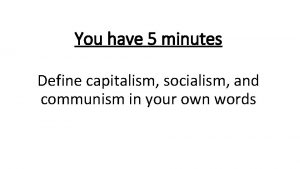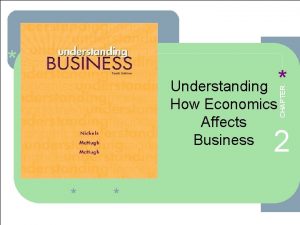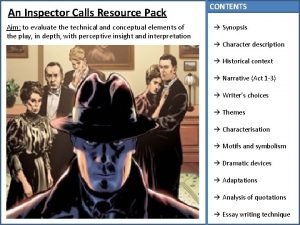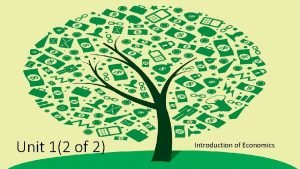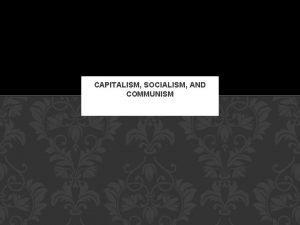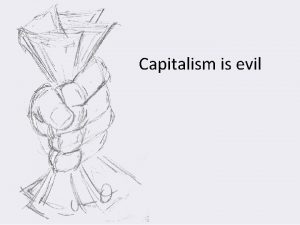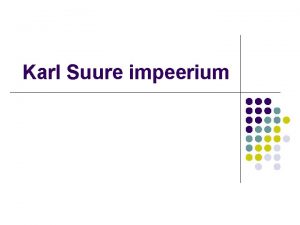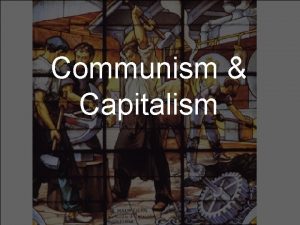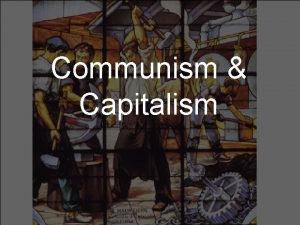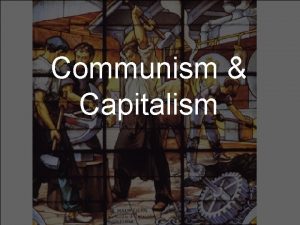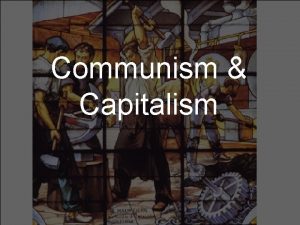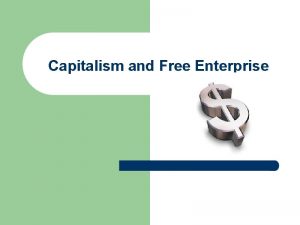Money and Power An Introduction to Capitalism Karl













- Slides: 13

Money and Power: An Introduction to Capitalism Karl Marx The Bourgeoisie/ The Proletariat Labour Theory Alienation

Conflict �Conflict occurs due to a differences in opinion, or social inequalities �Conflict can also occur between what people feel they deserve and what they receive: distribution of wealth and power in society

The Bourgeoisie & The Proletariat Karl Marx, a sociologist, economist, revolutionary socialist in the 1800 s examined inequalities between two types of people: �The Bourgeoisie (the people who owned property, the means of production); and �The Proletariat (the working class, the people who owned their labour power)

�The Bourgeoisie accumulated power by controlling and owning the means of production= own large-scale operations and corporations that produce the goods people in society consume �The Proletariat are the working class; they work for the ruling class and consume products of big companies �Marx= the bourgeoisie exploited the working class and opressed them through this ideology we like to call : CAPITALISM


Capitalism: An Ideology � Marx saw capitalism as destructive= wanted to get rid of it � Many Westerners see Capitalism in a positive light � Superstructure of society: law, morality and education � The key to understanding a society at any point in history: mode of production (ex. feudal times= landlords owned and controlled it; capitalist= capital, machinery, mines, factories- owned and controlled by capitalists � In capitalist societies, capitalists own and control the productive resources; workers only own their labour


“Mo Money (for the capitalists), Mo Problems (for the labour workers)”

Marxism and Alienation �What is alienation? �Marx refers to alientation in economic terms: the aspect in which workers are disconnected from what they produce and why they produce= systemic result of capitalism �Workers lose control over their lives by losing control over their work= workers cease to be autonomous �Pre-capitalist societies example: A shoemaker would own his shop, set his own hours, determine his working conditions, shape and sell his own product= he was connected to his work.

�Today’s capitalist societies: average worker is replaceable; impersonal �Workers have lost control over the process of production, the products they produce, the relationships they have with each other= they have become estranged

Karl Marx’s Ideas �Humans cannot be humans under alienated conditions �Capitalism must be abolished if a society’s emancipation is to be complete �Real liberty does not exist until a worker controls his/her workplace and the products they produce �Profit should be dispersed equally amongst those who have contributed to the labour of the product

“Capitalism: A Love Story” �http: //www. youtube. com/watch? v=UNl_G 0 m_ABU

New Vocabulary � Working Class: sometimes called the proletariat, typically blue-collar jobs, those who work for a salary. � Eviction/Notice of Eviction: removal of a tenant/tenants (person/people living in a household) from rental property by the landlord; removal of people from a home that is in foreclosure � Foreclosure/Foreclosed: the process where a bank will sell or take repossession of a home after the owner has repeatedly failed to pay their mortgage � Profit: money that is made off goods � “Bottom Feeders”: those people who exploit the weak and win economic advantage; who feed off the poor in hash economic times � Housing Crash: severe decrease in price of homes, which is a result of home owners holding mortgages that exceed the value of their homes � Free Enterprise: the economic system of capitalism: a separation between government interference in the economy; it is based on the idea that consumer’s interests will be best met with restricted government involvement in
 Kar; marx
Kar; marx Base and superstructure karl marx
Base and superstructure karl marx Money money money team
Money money money team Power traiangle
Power traiangle What is old money
What is old money Money smart money match
Money smart money match Money on money multiple
Money on money multiple Old money vs new money
Old money vs new money Context of the great gatsby
Context of the great gatsby Communism and capitalism dbq answer key
Communism and capitalism dbq answer key What are the pros of capitalism
What are the pros of capitalism Capitalism pros and cons
Capitalism pros and cons An inspector calls character
An inspector calls character Pros and cons of capitalism
Pros and cons of capitalism

